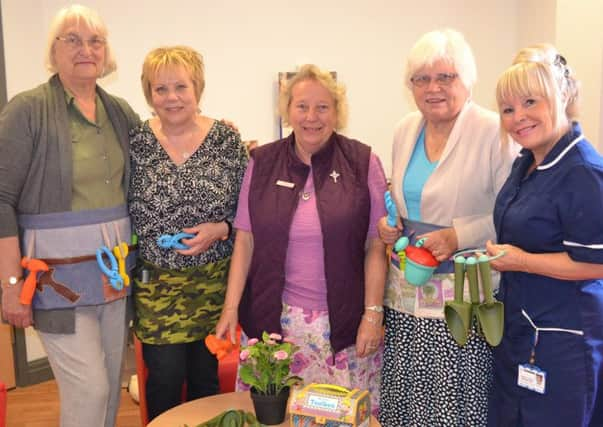Tool sets help soothe dementia patients at West Yorkshire hospitals


The Mothers’ Union in the Diocese of Leeds has created the new sets, which are predominantly aimed at male dementia patients.
Each belt has pockets containing a toy tool or gardening implement, which They can help reduce agitation.
Advertisement
Hide AdAdvertisement
Hide AdEileen Warburton, Episcopal Area President for Wakefield, knew that Bishop Tony Robinson had become a dementia ambassador for Mid Yorkshire Hospitals NHS Trust and thought the Mother’s Union could provide further support.
She said: “Bishop Tony put me in contact with Anita Ruckledge, lead dementia nurse at the trust, and I met with her to discuss what we could do.
“Anita showed me the Twiddlemuffs they already have for patients, and whilst they work really well, they appeal more to females. So we took away the challenge to come up with something more ‘male-friendly’.”
Toolboxes containing children’s plastic tools had been given to the ward and they thought these would be perfect, though Anita consulted with family of dementia patients to ensure their loved ones wouldn’t feel patronised.
Advertisement
Hide AdAdvertisement
Hide Ad“I’m absolutely delighted with the items that the Mothers’ Union has created for us,” said Anita. “Everyone I spoke to thought it was a great idea to have something for those who may have had gardening as a hobby or loved DIY.
“We needed to use plastic tools so that no one was at risk of injuring themselves, and everyone understood this.”
People with dementia often have restless hands and tactile items can help keep them occupied and provide brain stimulation.
They can also promote increased flexibility, as well as helping to evoke memories of hobbies and pastimes they may have had.
Advertisement
Hide AdAdvertisement
Hide AdDementia patients at Mid Yorkshire Hospitals already use Twiddlemuffs, which are knitted muffs with different items attached to them, but the tool belts were designed to appeal to male dementia sufferers. They will now be given to he Dementia Champions - clinical staff who have a greater understanding of caring for those with the disease – to trial and gather feedback.